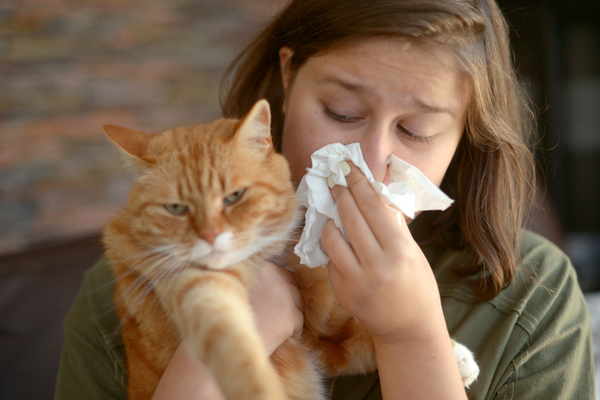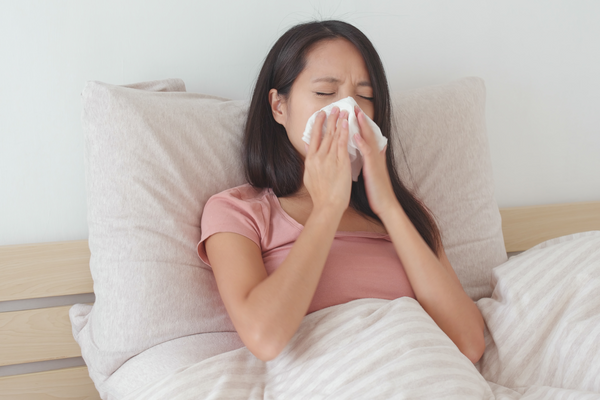Harsh Cleaning Products Can Damage Your Lungs. Here’s How To Clean Up Your Cleaning Routine

Whether you’re gearing up for your regular weekly cleaning routine or channeling your inner Monica Geller for an epic deep cleaning session, you might be wondering whether all those harsh chemicals listed on your go-to cleaning products are doing more harm than good. If you’re using conventional store-bought cleaners, the answer is very likely “yes.” It’s no secret that store-bought cleaners can be dangerous if mishandled; these cleaners can be harmful if accidentally mixed or cause irritating reactions if they come into contact with your skin. Some studies have even suggested a link between the use of cleaning products and increased air pollution indoors. And as these chemicals are washed down the drain, they find their way into our waterways, where they can affect wildlife and put additional strain on treatment plants to keep our water clean. However, recent research shows that even simply being exposed to fumes from harsh cleaning products may be much more dangerous than most people realize.
As consumers, it’s essential to know what’s in the products we use in our homes and around our loved ones – and to make sure we’re limiting our exposure to harsh chemicals. But, for those with chronic respiratory conditions like asthma, allergies, and chronic obstructive pulmonary disease (COPD), it’s vitally important to avoid these irritating chemicals.
In this article, we’ll explain the effects of cleaning chemical fumes on your lungs and tell you how to adjust your cleaning methods so that you have a more lung-friendly routine.
The Research on Cleaning Products & Lung Health
It’s long been known that exposure to harsh cleaning chemicals can cause asthma flare-ups and other chronic respiratory symptoms, but experts had little data on the long-term effects of these products on lung health. However, in the past few years, researchers have found strong links between cleaning chemical fumes and respiratory diseases.
One study from Harvard University and the French National Institute of Health and Medical Research, published in 2017, found a strong correlation between subjects' regular use of chemical cleaners and fatal lung diseases, including COPD. The 30-year study followed more than 55,000 nurses in the United States. Throughout the study, the researchers found that those who used bleach and other common disinfectants just once per week had a 32% higher risk of developing COPD.
Another study conducted by the University of Bergen in Norway, and published in the American Thoracic Society's American Journal of Respiratory and Critical Care Medicine, found that women who work as professional cleaners or who regularly clean the family home using conventional cleaning sprays or other products have a more significant decline in lung health over time than women who do not clean. In fact, researchers estimated that the amount of lung function these women lost was roughly equivalent to smoking a whole pack of cigarettes every day – and those who were exposed even more often than that experienced more severe lung decline.
"While the short-term effects of cleaning chemicals on asthma are becoming increasingly well documented, we lack knowledge of the long-term impact," said Professor Cecilie Svanes, MD, Ph.D., professor at the Centre for International Health at the University of Bergen, and the senior author of the study. "We feared that such chemicals, by steadily causing a little damage to the airways day after day, year after year, might accelerate the rate of lung function decline that occurs with age," Svanes added. Svanes and her colleagues studied 6,235 subjects in nine countries in western Europe. Participants had lung function tests and filled out questionnaires three times over 20 years. On average, the subjects were in their mid-30s when they enrolled. About half were female; 85% of women said they were the primary person cleaning at home. Altogether, 8.9% of the women and 1.9% of the men involved in the study said that cleaning was their occupation.
The study used two measurements to assess lung function: forced expiratory volume per second (the amount of air a person can forcibly exhale in a second) and forced vital capacity, or the total amount a person can exhale in a second. Over the two decades of the study, women not working as professional cleaners and not involved in cleaning at home showed the slowest declines in lung function. Compared to those women, women who used cleaning sprays or other chemical cleaning products at least once a week had a faster decline in lung function. The decrease was more immediate still for women who worked as cleaners. In addition, they found that asthma was more prevalent in women who cleaned at home (12.3%) or at work (13.7%), compared with those who did not clean (9.6%). Despite including men in the study, the researchers could not find any substantial evidence of cleaning product-related lung decline in men. However, that doesn't mean that men who get regularly exposed to fumes from cleaning chemicals are any less at risk; the researchers noted that the men in the study simply did not use cleaning products as often as the women subjects, which likely left them with too small a sample to detect such effects among the men. The researchers said that the decline in lung health might be due to the irritation that most cleaning chemicals cause on the mucous membranes lining the airways, which can cause long-term changes.
What Harsh Fumes From Cleaning Products Do To Your Lungs
Any time you use a chemical cleaning solution, it emits fumes into the air that you – and everyone else inside your home – inevitably end up breathing. Many harsh chemicals found in conventional household products create fumes that are incredibly irritating to your lungs. As soon as these noxious fumes reach your lung tissue, they can cause inflammation, coughing, sneezing, shortness of breath, and other adverse symptoms. These fumes can also irritate your eyes, nose, and upper airways, causing a sharp, burning pain when you breathe. Being exposed to a lot of fumes at once can also cause sore throat, nausea, headache, dizziness, stomach pain, and more. And these are only the acute, immediate effects of exposure to harsh chemicals. As the Harvard and University of Bergen studies show, breathing in even small amounts of fumes over a long period can cause chronic health problems and, alarmingly, even permanent damage to your lungs.
Which Cleaning Products Are Particularly Harmful?
Clever marketing and colorful packaging may lead you to believe that a product is gentle enough to use in your home and around your children and pets. However, the reality is that many household cleaners available today are loaded with harsh, irritating chemicals. Certain harsh cleaning chemicals, like ammonia and bleach, are particularly harmful to breathe. For instance, the 2017 Harvard study found that exposure to cleaning solutions containing bleach seemed especially likely to cause respiratory decline and even lead to COPD later in life. Unfortunately, ammonia and bleach are some of the most common chemicals found in commercial cleaning products. If you don't read the ingredients carefully, you might even use cleaners containing ammonia or bleach without even realizing it.
According to the American Lung Association, many cleaning supplies or household products can irritate the eyes or throat or cause headaches and other health problems, including cancer. Some products can release dangerous chemicals, including volatile organic compounds (VOCs). VOCs are chemicals that emit toxic gases during use and provoke respiratory inflammation and irritation. VOCs and other harsh chemicals released when using cleaning supplies contribute to chronic respiratory problems, allergic reactions, headaches, and more.
Products that contain the ingredient “fragrance” can be particularly harmful. But what exactly is fragrance? Simply put, “fragrance” is an umbrella term that the household product industry uses on ingredient lists that discloses only that there are unidentified chemicals in the product. The truth is that any one synthetic fragrance can be made up of potentially hundreds of different ingredients, including phthalates – which have been linked to many hazardous health conditions, including reproductive malformation, liver and breast cancers, and diabetes – as well as several hormone-disrupting synthetic musks, including galaxolide, tonalide, musk xylene, and musk ketone. Fragranced products can also exacerbate symptoms in people with asthma, allergies, or COPD. Even natural fragrances such as citrus can react to produce dangerous pollutants indoors. So, while these products may smell sweet and appealing, it’s best to steer clear of using them in your home.
Cleaning supplies and household products containing VOCs, phthalates, and other irritating chemicals can include, but are not limited to:
- Aerosol spray products (including health, beauty, and cleaning products)
- Air fresheners
- Chlorine bleach
- Dishwashing liquid
- Dry cleaning chemicals
- Laundry detergent
- Rug and upholstery cleaners
- Furniture and floor polish
- Oven cleaners
Related: It’s Time to Bid Bleach Farewell, For Good. Here’s Why
Tips for Lung-Friendly Cleaning
Cleaning our home sanctuary is an essential part of healthy living, but there are a few simple steps you can take to make your cleaning routine better for your lungs – and the planet.
Avoid Aerosol Cleaners & Sprays
Aerosol products, like air fresheners or aerosolized sanitizers, push chemicals into the air for you to breathe in. So, it’s vital to take particular care when using these products or avoid them altogether. Remember, inhalation of gases, mists, aerosols, fumes, or dust may cause irritant lung injury, asphyxiation, or other systemic effects.
Wear Protective Equipment & Ventilate
If you use harsh cleaning products in your home, always use them in a well-ventilated area and wear protective equipment, like eye protection, gloves, and a mask.
Skip Scented Laundry Products
Rather than using harmful scented laundry products, opt for a fragrance-free laundry detergent and just say “no” to perfumed softeners and dryer sheets. Our allergist and dermatologist recommended Anti-Allergen Laundry Detergent is plant and mineral-based and 100% biodegradable, making it a planet-friendly choice. It’s also hypoallergenic and does not contain fragrance, dyes, or perfumes. And while it’s gentle on household washables, it’s powerful enough to remove even the toughest odors and stubborn stains.
In the place of dryer sheets or softeners, try using wool dryer balls; a set of four usually costs less than a month’s supply of single-use dryer sheets. Dryer balls are a fantastic all-natural way to soften your clothes, eliminate static, and reduce energy usage by drying your clothes faster. All without leaving a chemical residue all over your clothing and laundry machines.
Decrease the Number of Cleaning Products and Harsh Chemicals You Use In Your Home
Many people use multiple products to clean their homes. For instance, they may use bleach, toilet bowl cleaner, and ammonia-based glass cleaner in the bathroom; all-purpose cleaner and bleach in the kitchen; air freshener spray in the living room; and an aerosol disinfectant spray in every room in the house. Using multiple products can result in dangerous chemical reactions and can be detrimental to lung health. Instead of using various cleaning products in your home, use one product to tackle every job, like Vital Oxide. Vital Oxide can be used to clean, disinfect, remove stains, eliminate odors, neutralize allergens, and more, all while being free of bleach, ammonia, VOCs, fragrance, and harsh chemicals.

Have questions about cleaning or reducing harsh chemicals in your home? We have answers! The Ecology Works has been leading the way in green cleaning since 1993. We can help you select the products you need to live a better, allergen-free life. Please feel free to Contact Us or message us on Facebook. No question is too small! We're here to help.





